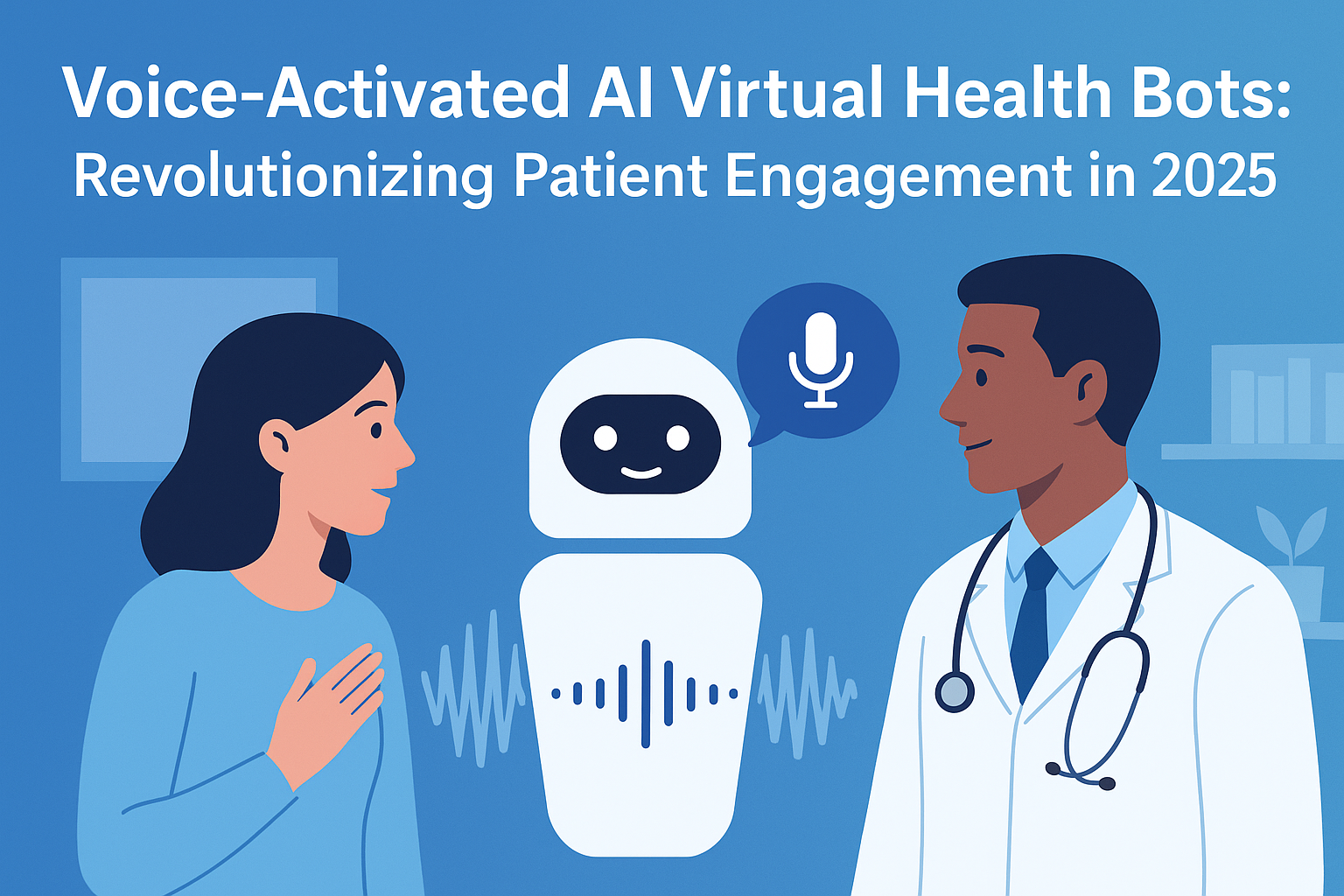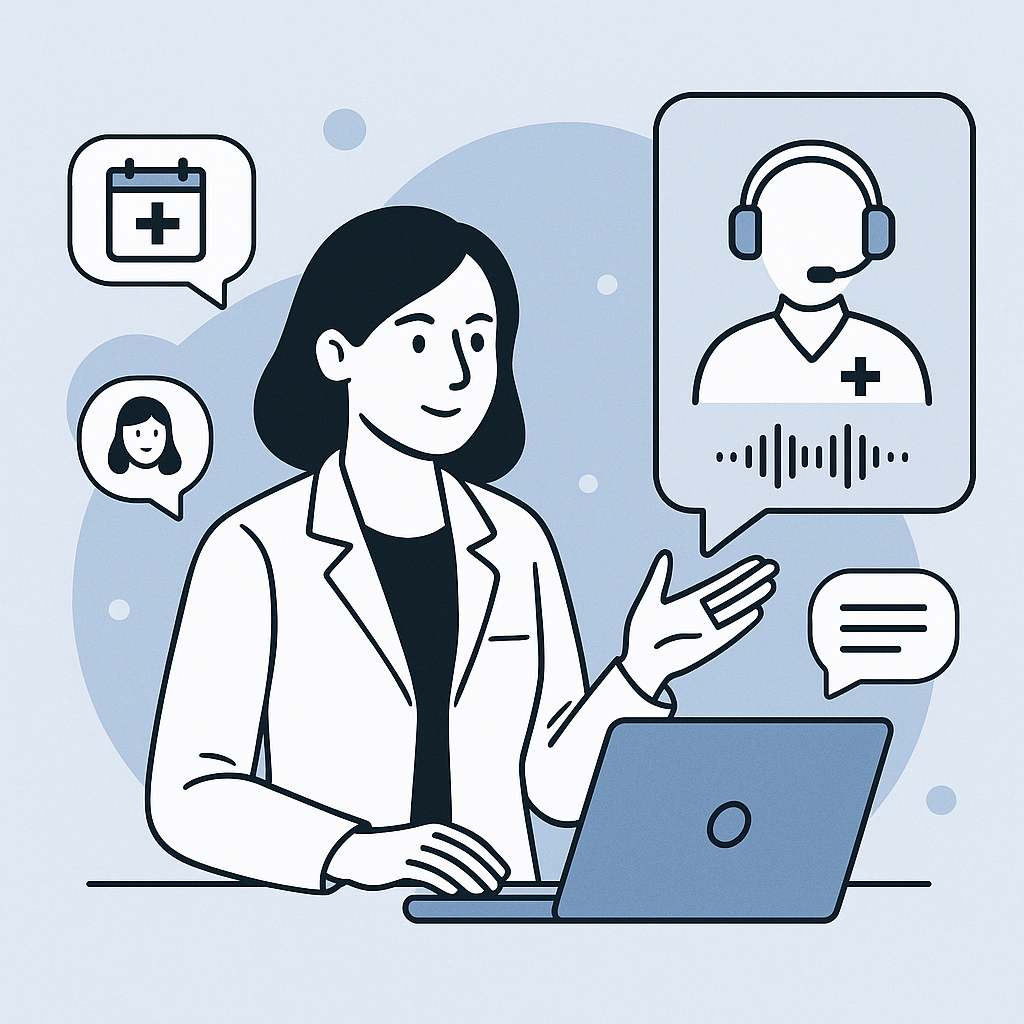Healthcare is not limited only to clinics and hospitals; even patients today need instant communication and personalized satisfaction from health providers, as they receive from other sectors.
Research shows that 81% of patients prefer healthcare providers who offer digital communication options. When compared with traditional chatbots, the real breakthrough comes from voice-activated AI virtual assistants.
These assistants were developed with natural language processing (NLP), speech recognition, and healthcare-specific AI to deliver hands-free, conversational care.
Whether it’s about booking appointments, checking symptoms, or receiving medication reminders, voice AI is transforming how patients interact with healthcare providers.
If you are looking for the right AI virtual health assistant, fill out the form to receive a free consultation right away!
Let’s explore the data, real-world applications, benefits, and challenges that make voice-activated AI health bots the next frontier in patient engagement.
Why Voice AI Is the Next Frontier in Healthcare?
Explosive Market Growth
The global AI virtual assistant market in healthcare is projected to grow from $678 million in 2023 to $9.3 billion by 2030, with a CAGR of nearly 34%. Voice technology, specifically, is experiencing accelerated adoption:
- 72% of users in India already rely on voice commands for daily searches.
- Globally, 50% of adults use voice search daily, often for location-based and health-related queries.
This trend signals a massive opportunity for healthcare providers who integrate voice-first experiences into their patient engagement strategies.
From Reception Calls to Voice AI: Best Patient Engagement Strategy
The Rise of Voice Search in Healthcare
Unlike typed searches, voice queries are longer and more conversational. For instance:
- Typed: “dermatologist near me”
- Voice: “Which dermatologist near me is open today and accepts new patients?”
For clinics and hospitals, optimizing content and systems to handle these natural queries is becoming critical. Voice AI bots are built for this exact interaction style—making healthcare more accessible, efficient, and human-like.
Core Benefits of Voice-AI Virtual Health Bots
1. Improved Accessibility
Voice bots remove the need for typing, making them ideal for:
- Elderly patients who may struggle with apps.
- Visually impaired individuals who rely on voice commands.
- Remote or rural populations with limited digital literacy.
By making healthcare more inclusive, providers can expand their reach and improve health equity.
2. Operational Efficiency & Cost Savings
Healthcare staff spend countless hours on repetitive tasks like appointment scheduling, follow-ups, and reminders. Voice AI bots automate these processes.
- Apollo Hospitals reported a 46% increase in provider productivity after adopting a voice AI solution, saving 44 hours per provider per month.
- Clinics using voice bots for appointment confirmations reduced no-show rates by up to 25%, cutting operational costs significantly.
3. Enhanced Patient Engagement & Adherence
Medication non-adherence costs the healthcare system billions annually. Voice bots offering personalized reminders and follow-ups have been shown to improve adherence rates by 11–25%, ensuring patients stay on track with treatment.
4. Better Patient Experience
Patients appreciate instant support. A hospital in the US reported a 30% increase in satisfaction scores within six months of deploying a voice AI bot. By offering empathetic, conversational support, these bots improve both patient trust and loyalty.
Real-World Use Cases of Voice-AI in Healthcare
Symptom Triage & Telemedicine
- Mayo Clinic uses a voice symptom checker to guide patients toward appropriate care, reducing unnecessary ER visits and optimizing telemedicine resources.
Appointment Scheduling & Reminders
- Clinics and hospitals deploy voice bots to book, confirm, and remind patients of appointments, cutting staff workload and lowering no-show rates.
Administrative Automation
- Companies like Infinitus created Eva, a voice bot that automates insurer communications. It replaced manual calls, quadrupling processing speed, and reducing staffing needs by over 100 positions.
Patient Portal Navigation
- Providers such as NewYork–Presbyterian and Kaiser Permanente integrate voice search into portals, allowing patients to request lab results, refill prescriptions, or find doctors with simple voice commands.
Competitor Landscape – Who’s Leading the Voice AI Race?
The healthcare voice AI market is competitive, with leading solutions including:
- Nuance (Microsoft) – Clinical documentation via speech recognition.
- Orbita – HIPAA-compliant conversational AI for healthcare.
- Amazon Alexa for Healthcare – Voice-enabled patient engagement services.
- Olive AI – Automating repetitive workflows in hospitals.
- Voiceoc – Specializing in AI healthcare bots that streamline patient engagement, appointment scheduling, and virtual front-desk automation.
Unlike generic voice tools, Voiceoc focuses exclusively on healthcare, offering deep customization and real-world outcomes like reduced no-shows, faster scheduling, and improved patient engagement.
Challenges of Voice AI in Healthcare
While promising, implementing voice AI comes with challenges:
- Privacy & Security
Voice data must comply with HIPAA, GDPR, and local health regulations, ensuring patient confidentiality. - Accuracy & Reliability
Misinterpretations by NLP can be risky in healthcare. The best solutions integrate human-in-the-loop models to validate sensitive interactions. - Integration with EHRs
Seamless connection with Epic, Cerner, or other EHRs requires technical expertise. Providers must plan for interoperability from the start.
Searching for a right AI virtual Health receptionist? Then,
Schedule a 30-min free consultation today!
The Future of Voice-AI in Patient Care
Looking ahead, voice-activated bots will evolve from assistants into health companions. They will:
- Monitor chronic conditions by integrating with wearables
- Support emotional health by offering empathetic conversations.
- Predict health risks using AI-driven analytics.
Powerful Ways to Optimize Front Desk Healthcare Operations
In short, voice AI bots will make healthcare more proactive, personalized, and patient-centric.
Conclusion
Voice-activated AI virtual health bots are not just futuristic add-ons—they are becoming essential to modern patient engagement strategies. By improving accessibility, reducing operational burdens, and enhancing the patient experience, they are reshaping healthcare in 2025 and beyond.
Hospitals and clinics that embrace this innovation will not only improve patient outcomes but also stay competitive in an increasingly digital-first healthcare landscape.
With specialized providers like Voiceoc, healthcare organizations can implement HIPAA-compliant, intelligent, and scalable voice AI solutions that truly revolutionize patient care.




.png)







